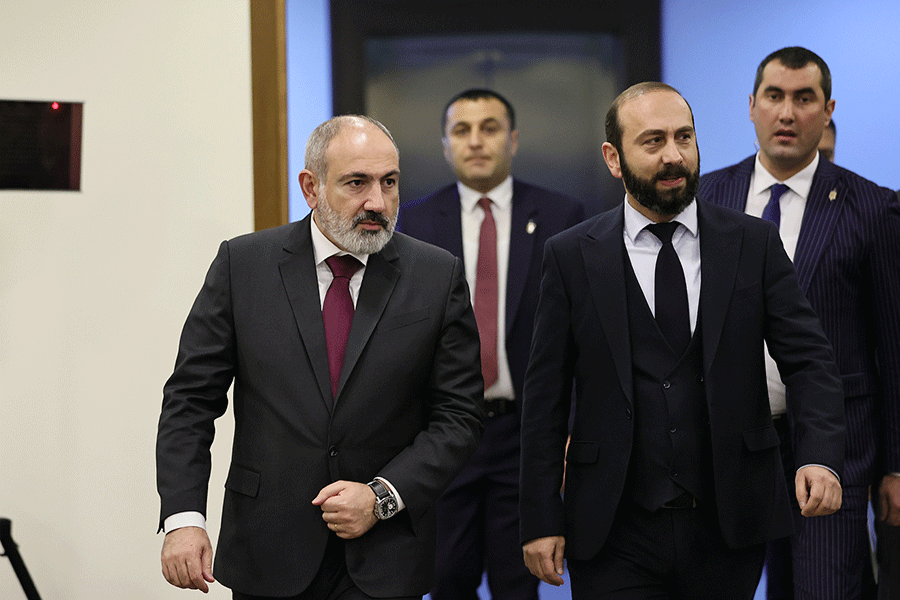by Suren Sargsyan
The US engagement in the South Caucasus has become more active since the 2020 war, with increased anti-Russian sentiment in the region as well as the Russia-Ukraine war allowing for greater US involvement. Of course, Armenia operates within the existing South Caucasus dynamics rather than pursuing its own foreign policy while global players such as Russia and the United States are competing. Small states can participate in global processes rather than solely adapting to them, but this doesn’t apply to present-day Armenia. No matter how much anti-Russian sentiment is present, Armenia does not take steps which may come into direct conflict with Russia’s interests. Armenia is conducting a fearful or adaptive foreign policy, which is the result of failures in war and failures on the diplomatic front.
Thanks to the decline of Russian influence, the US is trying to use this historical momentum while Russia is fighting against Ukraine to try to take Armenia out of the zone of Russian influence. This of course explains US active engagement in the South Caucasus, particularly in terms of the activation of high level contacts with Armenia. The US-Armenian bilateral agenda hasn’t been enriched, but the US aims to bolster its presence in Armenia as fast as possible. As US Ambassador to Armenia Kristina Kvien has stated, US relations with Armenia “in just about every sector have expanded and deepened.”
But when we take a broader perspective, we also observe other regional advancements. Significant changes are taking place in neighboring Georgia. One might observe the greater interest and involvement on the US side with Armenia, in different spheres, including military, while relations with its traditional ally in South Caucasus – Georgia, have deteriorated.
Read also
Currently, we can see that there are ongoing geopolitical rearrangements in the South Caucasus region: specifically the traditional spheres of influence of the superpowers are somehow being modified. Georgia, being the US strategic ally in the region for years and seeking closer ties with the United States and EU countries, is now diverging from this path and repositioning itself towards Russia. More specifically, the “Foreign Agent” act (dubbed as the “Russian law”) introduced by the Georgian government has raised serious controversy and severed Georgia’s relations with the US and EU, leading to a hold on Georgia’s potential membership in the EU. These changes in Georgia’s foreign policy vector are neither welcomed by majority of its own people, nor by the Western countries. In addition, Georgia and Russia are very close to re-establish direct contacts, and diplomatic relations.

Suren Sargsyan
To put it simply, Russia’s influence is growing in a pro-Western Georgia while Western influence is growing in traditionally pro-Russian Armenia, and this is the essence of competition. There is no need to refer to Azerbaijan, because it is completely under Turkish influence, but it is also trying to deepen relations with Russia.
The US-Armenian deepened relations is not due to a robust bilateral agenda but rather due to the geopolitical vacuum in Armenia created after the significant decrease of Russia’s influence in Armenia since the 2020 War in Artsakh. The US is now pursuing its strategic objective of countering “Russia’s attempts to weaken and destabilize sovereign nations” as stipulated in the National Security Strategy of Biden administration. This includes attempts to fill the geopolitical void in Armenia by backing the “diplomatic efforts to resolve conflict in the South Caucasus.” In doing so the USA is countering Russia in the country by getting deeply engaged with the Armenian government, which is ready to normalize relations with Turkey and Azerbaijan by making unilateral concessions and meeting all the preconditions put by Azerbaijan and Turkey. In turn, normalized relations with Turkey and Azerbaijan would mean decreased Russian influence in the region.
Another key area which signaled the increase of the US role in Armenia was the US-Armenia Strategic Dialogue which was launched in 2022 by Secretary Antony Blinken and Armenian Foreign Minister Ararat Mirzoyan in Washington, D.C. Since then, the Strategic Dialogue has been active and includes key areas of the cooperation; furthering democratic reforms and promoting mutual prosperity, security, peace, and regional conflict resolution and looking to tangible results. In 2023 the US Assistant Secretary of Commerce visited Armenia participating in the US-Armenia Strategic Dialogue underscoring the United States’ interest in deepening commercial ties and promoting commercial partnerships. On June 11, 2024, Assistant Secretary for Europe and Eurasia James C. O’Brien and an interagency government delegation visited Armenia to take part in the U.S.-Armenia Strategic Dialogue (USASD) Capstone meeting. More importantly, the meeting provided the vision for the upcoming year of upgrading the status of US-Armenian bilateral dialogue to a Strategic Partnership Commission. Hence, the role of Armenia for the US seems to be entering a new stage of strategic cooperation in contrast with Georgia, with which the US is lowering the level of strategic relations.
In line with this new policy there are more high-level visits to Armenia now as compared to previous years. It is noteworthy that the Deputy Director of the CIA, David Cohen paid a visit to Armenia at the end of May, 2024. The intriguing aspect of the visit was that the Armenian government’s press statement notably omitted any detailed description of his visit. It was just mentioned that the sides discussed “Armenia-US bilateral, as well as international agenda issues.” There was not even a joint photograph attached to the short statement on the meeting.
This was not the first visit of a high-level CIA official to Armenia. The director of the CIA William Burns visited Armenia on July 15, 2022. The purpose of the visit was the discussions of the normalization of Armenian-Azerbaijani and Armenian-Turkish relations. Through this high level visit the US once again highlighted that those issues are among the US priority interests with regard to Armenia and that the US intends to promote and support the normalization processes with the ultimate goal of decreased Russian influence in Armenia and the region and deeper ties with the West. In this regard, the US would rather have Turkey as an alternative patron state for Armenia instead of Russia. And one of the most recent high-level visits to Armenia was by USAID Administrator Samantha Power marking her second visit to Armenia since September 2023.
The other side of the coin is that on the surface, Armenia’s ties with Russia appear worsened in recent years. Prime Minister Nikol Pashinyan’s administration claims that Moscow has not fulfilled its security commitments and is pursuing stronger relations with Western countries. The Armenian government has even “frozen its membership” in the Collective Security Treaty Organization (CSTO) for not fulfilling its security obligations considering Azerbaijan’s seizure of Armenian territory and does not pay the membership fee, although such a mechanism does not exist in the charter of organization.
The tensions between these longtime allies escalated following Azerbaijan’s recapture of Nagorno-Karabakh in September last year. Moscow in turn has consistently accused Pashinyan of undermining Russian-Armenian relations. Although Russian-Armenian relations might seem tense, taking into account all the developments since 2018 and after the 2020 war, on a high level the relations overall still look quite good. This has been stated numerous times by both the Armenian and the Russian leadership. For example, during a recent meeting between Pashinyan and Putin, it was stated that the bilateral relations between Armenia and Russia “are developing successfully.” The trade turnover between the countries has increased 14 times since 2015. Thus, despite the perceived tensions in Russian-Armenian relations, Armenia has never taken active measures that would harm Russian interests. While there might have been some negative or contradictory remarks, in reality Armenia has refrained from specific actions directed against Russian strategic interests.
Coming back to US-Armenia relations, in 2023 the USA and Armenia conducted joint military exercises for the first time since 2008. “Eagle Partner 2023” was held on September 11-20 with about 85 American and 175 Armenian soldiers participating in the exercises. The drill pursued several goals, including strengthening the US alliance with Armenia, promoting interoperability, and preparing the Armenian 12th Peacekeeping Brigade for the NATO Operational Capability Concept assessment within the framework of NATO’s Partnership for Peace program. It’s important to stress here that Armenia has been participating in NATO’s peacekeeping missions since 2004.
Both Armenia and the US have shown willingness to continue cooperation in the military sector. Hence, “Eagle Partner 2024” Armenia-US joint exercises took place from July 15 to 24 in Armenia. The participants of the exercise were the Armed Forces of Armenia, the US Army Europe and Africa, and the Kansas National Guard. Armenia’s continued membership in CSTO and the Eurasian Economic Union suggests a hesitancy to make independent strategic decisions, instead relying on direction from major regional powers like Russia and the United States. Armenia should utilize the diplomatic tools of small countries and advocate for its interests amidst challenges, while also considering the interests of global powers.



















































